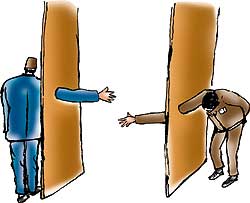 In the past two years, everything we as Nepalis have accomplished and taken pride in has been systematically dismantled. In fact, if we were conspiracy-minded we would say that it seems to be that someone is slowly, and systematically, killing our nation.
In the past two years, everything we as Nepalis have accomplished and taken pride in has been systematically dismantled. In fact, if we were conspiracy-minded we would say that it seems to be that someone is slowly, and systematically, killing our nation. Yes, a lot of things went wrong after 1990. Our politicians were corrupt and feckless, they forgot about governance and ravaged the country. But even die-hard cynics will admit that there had been progress. So, how come the Maoists have targetted these few areas where there had been advances in development, in infrastructure and in the evolution of the institutions of democracy?

The Maoists said they will leave tourists alone, but the insurgency they unleashed has devastated tourism. Hundreds of thousands have lost their livelihood, and have been forced to migrate abroad to work. Arrivals have plummeted, with serious consequences for the economy. Lately, armed bandits known as khaobadis have started extorting and robbing tourists in the name of revolution. Nepal's eco-tourism projects which had won worldwide acclaim are in deep trouble, national parks and nature sanctuaries are being encroached by smugglers and poachers.
Nepal was the first country in the region to open up energy generation to foreign joint ventures. For the first time in our history, we have surplus hydropower generation capacity. Nepal's success story in micro-hydro development, building investment and technical capacity at the grassroots for power generation has been recognised as a model for developing countries. Small hydropower plants have been systematically targetted for bombings, medium-scale plants specifically designed for rural electrification like Jhimruk, Andhikhola have been put out of action, and for the first time hydropower plants built with foreign investment have been hit. Who is it that wants to sabotage the one sector besides tourism that has the potential to turn our economy around?
Then take telecommunications. We had one of the best phone networks in the region six years ago, and this was a vital achievement for a mountainous country with few roads. Half the villages in this country had phones, and if things had gone according to plan three-fourths would have been wired by now. By picking off one microwave relay station after another, the Maoists have set us back ten years. One-third of the 75 districts in the country today do not have phones.
We had other success stories: our community forestry programme took 20 years to build with painstaking legislative changes, advocacy campaigns and local awareness-building. It has increased forest cover in the midhills, and agro-forestry has made farmers self-sufficient in fuelwood, fodder and food. Nepal's small farmers' development projects with their micro-credit component may not be as famous as Bangladesh's Grameen Bank, but they are every bit as effective.
All this progress in grassroots development has been made possible because local governance structures could be put into place through political devolution legislated by the Local Self-governance Act. For the first time in our nation's history, grassroots democracy had given Nepalis control over their own destiny. It is not by chance that the Maoists have taken apart this network. By destroying two-thirds of all village councils, killing hundreds of elected local leaders, they have wrecked precisely that aspect of democracy that was working.
Since 1990, our national-level political leaders tarnished the image of the judiciary, police and the civil service with corruption and politicisation. But the two institutions which had so far remained intact: the monarchy and the Royal Nepal Army have also been dragged into controversy. The last remaining symbol of our unity is now just another political force. And our military's reputation is also frayed.
Could all of this have happened by chance? If not, who was responsible? Is there, as Girija Koirala has been saying, a "grand design"? Whose design?
We know who is responsible: we are. There is no point looking for ghosts and scapegoats. We are all collectively responsible for letting things slide. We are all guilty of standing aside, being cynical, fatalistic and only bemoaning how bad things are. It is we who have the responsibility to set things right, and we can all start by being a little less cynical ourselves, being less divisive, and mustering greater unity of purpose. For starters, it requires all of us individually to be more honest, efficient, committed and positive.


